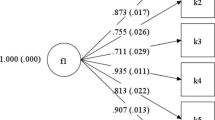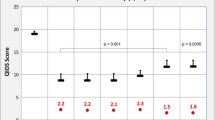Abstract
Depression is one of the most prevalent psychiatric comorbidities of HIV and one of the greatest barriers to HIV self-care and adherence. Despite this, little consensus exists on how to best measure depression among people living with HIV/AIDS (PLWHA) in African settings. Measurement of depression among PLWHA may be confounded by somatic symptoms. Some research recommends excluding these items to enhance measurement validity; sensitivity may be lost with this approach. We sought to characterize depression among a cohort (N = 453) of PLWHA initiating antiretroviral therapy in Uganda via factor analysis of a widely used measure of depression, the Hopkins Symptom Checklist (HSCLD). Common factor analysis was performed, associations between HSCLD and the Mental Health subscale of the Medical Outcomes Study HIV (MOS-HIV) estimated, and a Cronbach’s alpha calculated to examine validity. Factor analysis yielded two factors: (1) somatic-cognitive symptoms and (2) behavioral disengagement. Persons with more versus less advanced disease (CD4 cell count of ≤200 cells/mm3) showed no statistically significant differences in depression scores (1.7 vs. 1.7, P ≥ 0.5). Both factors were significantly associated with the MOS-HIV (P < .01). Factor one was highly reliable (α = .81); factor two had only modest reliability (α = .65). Somatic-cognitive symptoms of depression and disengagement from life’s activities appear to be distinct components of depression in this sample. Consideration of somatic items may be valuable in identifying depression in this setting.
Similar content being viewed by others
References
Murray CJL, Vos T, Lozano R, Naghavi M, Flaxman AD, Michaud C, et al. Disability-adjusted life years (DALYs) for 291 diseases and injuries in 21 regions, 1990–2010: a systematic analysis for the Global Burden of Disease Study 2010. The Lancet. 2012;380(9859):2197–223.
Kaharuza FM, Bunnell R, Moss S, Purcell DW, Bikaako-Kajura W, Wamai N, et al. Depression and CD4 cell count among persons with HIV infection in Uganda. AIDS Behav. 2006;10(1):S105–11.
Olley BO, Seedat S, Nei DG, Stein DJ. Predictors of major depression in recently diagnosed patients with HIV/AIDS in South Africa. AIDS Patient Care STDs. 2004;18(8):481–7.
Martinez P, Tsai AC, Muzoora C, Kembabazi A, Weiser SD, Huang Y, et al. Reversal of the Kynurenine Pathway of Tryptophan Catabolism may improve depression in ART-treated HIV-infected Ugandans. J Acquir Immune Defic Syndr. 2014;65(4):456–62.
Hatcher AM, Tsai AC, Kumbakumba E, Dworkin SL, Hunt PW, Martin JN, et al. Sexual relationship power and depression among HIV-infected women in Rural Uganda. PLoS ONE. 2012;7(12):e49821.
Tsai AC, Bangsberg DR, Frongillo EA, Hunt PW, Muzoora C, Martin JN, et al. Food insecurity, depression and the modifying role of social support among people living with HIV/AIDS in rural Uganda. Soc Sci Med 1982. 2012 Jun;74(12):2012–9.
UNAIDS. Global Fact Sheet [Internet]. 2012. Available from: http://www.unaids.org/en/media/unaids/contentassets/documents/epidemiology/2012/gr2012/20121120_FactSheet_Global_en.pdf. Accessed 20 May 2014.
Byakika-Tusiime J, Crane J, Oyugi JH, Ragland K, Kawuma A, Musoke P, et al. Longitudinal antiretroviral adherence in HIV+ Ugandan parents and their children initiating HAART in the MTCT-Plus family treatment model: role of depression in declining adherence over time. AIDS Behav. 2009;13(Suppl 1):82–91.
Do NT, Phiri K, Bussmann H, Gaolathe T, Marlink RG, Wester CW. Psychosocial factors affecting medication adherence among HIV-1 infected adults receiving combination antiretroviral therapy (cART) in Botswana. AIDS Res Hum Retrovir. 2010;26(6):685–91.
Antelman G, Kaaya S, Wei R, Mbwambo J, Msamanga GI, Fawzi WW, et al. Depressive symptoms increase risk of HIV disease progression and mortality among women in Tanzania. J Acquir Immune Defic Syndr. 2007;44(4):470–7.
Patel R, Kassaye S, Gore-Felton C, Wyshak G, Kadzirange G, Woelk G, et al. Quality of life, psychosocial health, and antiretroviral therapy among HIV-positive women in Zimbabwe. AIDS Care. 2009;21(12):1517–27.
Adewuya AO, Afolabi MO, Ola BA, Ogundele OA, Ajibare AO, Oladipo BF, et al. Relationship between depression and quality of life in persons with HIV infection in Nigeria. Int J Psychiatry Med. 2008;38(1):43–51.
Nakasujja N, Skolasky RL, Musisi S, Allebeck P, Robertson K, Ronald A, et al. Depression symptoms and cognitive function among individuals with advanced HIV infection initiating HAART in Uganda. BMC Psychiatry. 2010;10(1):44.
Bolton P. Cross-cultural validity and reliability testing of a standard psychiatric assessment instrument without a gold standard. J Nerv Ment Dis. 2001;189(4):238–42.
Bolton P, Wilk CM, Ndogoni L. Assessment of depression prevalence in rural Uganda using symptom and function criteria. Soc Psychiatry Psychiatr Epidemiol. 2004;39(6):442–7.
Martinez P, Andia I, Emenyonu N, Hahn JA, Hauff E, Pepper L, et al. Alcohol use, depressive symptoms and the receipt of antiretroviral therapy in southwest Uganda. AIDS Behav. 2008;12(4):605–12.
Kaaya SF, Fawzi MCS, Mbwambo JK, Lee B, Msamanga GI, Fawzi W. Validity of the Hopkins Symptom Checklist-25 amongst HIV-positive pregnant women in Tanzania. Acta Psychiatr Scand. 2002;106(1):9–19.
Kalichman SC, Rompa D, Cage M. Distinguishing between overlapping somatic symptoms of depression and HIV disease in people living with HIV-AIDS. J Nerv Ment Dis. 2000;188(10):662–70.
Cherian VI, Peltzer K, Cherian L. The factor-structure of the Self Reporting Questionnaire (SRQ-20) in South Africa. East Afr Med J. 1998;75(11):654–6.
Okello ES, Neema S. Explanatory models and help-seeking behavior: pathways to psychiatric care among patients admitted for depression in Mulago hospital, Kampala, Uganda. Qual Health Res. 2007;17(1):14–25.
Penayo U, Kullgren G, Caldera T. Mental disorders among primary health care patients in Nicaragua. Acta Psychiatr Scand. 1990;82(1):82–5.
International HIV Antiretroviral adherence, resistance and survival. ClinicalTrials.gov [Internet]. [cited 2013 Aug 19]. Available from: http://clinicaltrials.gov/ct2/show/NCT01596322. Accessed 20 May 2014.
Winokur A, Winokur DF, Rickels K, Cox DS. Symptoms of emotional distress in a family planning service: stability over a four-week period. Br J Psychiatry. 1984;144(4):395–9.
Wu AW, Rubin HR, Mathews WC, Ware JE Jr, Brysk LT, Hardy WD, et al. A health status questionnaire using 30 items from the Medical Outcomes Study: preliminary validation in persons with early HIV infection. Med Care. 1991;29(8):786–98.
Wu AW, Revicki DA, Jacobson D, Malitz FE. Evidence for reliability, validity and usefulness of the Medical Outcomes Study HIV Health Survey (MOS-HIV). Qual Life Res. 1997;6(6):481–93.
Stangl AL, Bunnell R, Wamai N, Masaba H, Mermin J. Measuring quality of life in rural Uganda: reliability and validity of summary scores from the Medical Outcomes Study HIV Health Survey (MOS-HIV). Qual Life Res. 2012;21(9):1655–63.
Mast TC, Kigozi G, Wabwire-Mangen F, Black R, Sewankambo N, Serwadda D, et al. Measuring quality of life among HIV-infected women using a culturally adapted questionnaire in Rakai district Uganda. AIDS Care. 2004;16(1):81–94.
The Medical Outcomes Study HIV Health Survey (MOS-HIV) [Internet]. Johns Hopkins Bloomberg School of Public Health. [cited 2013 Aug 19]. Available from: http://www.jhsph.edu/research/affiliated-programs/medical-outcomes-study-HIV/index.html. Accessed 20 May 2014.
Floyd FJ, Widaman KF. Factor analysis in the development and refinement of clinical assessment instruments. Psychol Assess. 1995;7(3):286–99.
Cronbach LJ, Meehl PE. Construct validity in psychological tests. Psychol Bull. 1955;52(4):281–302.
Campbell DT, Fiske DW. Convergent and discriminant validation by the multitrait-multimethod matrix. Psychol Bull. 1959;56(2):81–105.
Cattell R. The meaning and strategic use of factor analysis. In: Cattell R, editor. Handbook of multivariate experimental psychology. Chicago, IL: Rand McNally; 1966.
Tsai AC, Bangsberg DR, Emenyonu N, Senkungu JK, Martin JN, Weiser SD. The social context of food insecurity among persons living with HIV/AIDS in rural Uganda. Soc Sci Med. 2011;73(12):1717–24.
Kalichman SC, Sikkema KJ, Somlai A. Assessing persons with human immunodeficiency virus (HIV) infection using the Beck Depression Inventory: disease processes and other potential confounds. J Personal Assess. 1995;64(1):86–100.
Olley BO, Seedat S, Stein DJ. Persistence of psychiatric disorders in a cohort of HIV/AIDS patients in South Africa: a 6-month follow-up study. J Psychosom Res. 2006;61(4):479–84.
Shacham E. Self-reported psychological distress symptoms of individuals self-seeking HIV-related psychosocial support in Western Kenya. Bloomington, ID: Indiana University; 2006.
Shacham E, Reece M, Ong’or WO, Omollo O, Basta TB. A cross-cultural comparison of psychological distress among individuals living with HIV in Atlanta, Georgia, and Eldoret, Kenya. J Int Assoc Physicians AIDS Care. 2010;9(3):162–9.
Reece M, Shacham E, Monahan P, Yebei V, Ong’or WO, Omollo O, et al. Psychological distress symptoms of individuals seeking HIV-related psychosocial support in western Kenya. AIDS Care. 2007;19(10):1194–200.
Wouters E, le Booysen FR, Ponnet K, Van Loon FB. Wording effects and the factor structure of the hospital anxiety & depression scale in HIV/AIDS patients on antiretroviral treatment in South Africa. PLoS ONE. 2012;7((4):e34881.
Lee B, Kaaya SF, Mbwambo JK, Smith-Fawzi MC, Leshabari MT. Detecting depressive disorder with the Hopkins Symptom Checklist-25 in Tanzania. Int J Soc Psychiatry. 2008;54(1):7–20.
American Psychiatric Association, American Psychiatric Association, Task Force on DSM-IV. Diagnostic and statistical manual of mental disorders: DSM-IV-TR. Washington, DC: American Psychiatric Association; 2000.
Hopko DR, Lejuez CW, Ruggiero KJ, Eifert GH. Contemporary behavioral activation treatments for depression: procedures, principles, and progress. Clin Psychol Rev. 2003;23(5):699–717.
Nezu AM, Nezu CM, D’Zurilla TJ. Problem-solving therapy: a treatment manual. 2013.
Tsai AC, Karasic DH, Hammer GP, Charlebois ED, Ragland K, Moss AR, et al. Directly observed antidepressant medication treatment and HIV outcomes among homeless and marginally housed HIV-positive adults: a randomized controlled trial. Am J Public Health. 2013;103(2):308–15.
Evans DL, Charney DS, Lewis L, Golden RN, Gorman JM, Krishnan KRR, et al. Mood disorders in the medically ill: scientific review and recommendations. Biol Psychiatry. 2005;58(3):175–89.
Tsai AC, Weiser SD, Petersen ML, Ragland K, Kushel MB, Bangsberg DR. A marginal structural model to estimate the causal effect of antidepressant medication treatment on viral suppression among homeless and marginally housed persons with HIV. Arch Gen Psychiatry. 2010;67(12):1282–90.
Denninger JW, Papakostas GI, Mahal Y, Merens W, Alpert JE, Nierenberg AA, et al. Somatic symptoms in outpatients with major depressive disorder treated with fluoxetine. Psychosomatics. 2006;47(4):348–52.
Acknowledgments
We would like to thank the UARTO study participants for sharing their experiences with us and the Mbarara-based study team, including Dr. Conrad Muzoora, Dr. Bosco Bwana, Annet Kembabazi and Dr. Anna Baylor, for providing study coordination and support. This work was funded by U.S. National Institutes of Health R01MH054907 and P30AI27763. The authors acknowledge the following additional sources of salary support: K23MH096651 (Psaros), K23MH087228 (Haberer), K23MH096620 (Tsai), K24MH087227 (Bangsberg), K24MH094214 (Safren).
Author information
Authors and Affiliations
Corresponding author
Rights and permissions
About this article
Cite this article
Psaros, C., Haberer, J.E., Boum, Y. et al. The Factor Structure and Presentation of Depression Among HIV-Positive Adults in Uganda. AIDS Behav 19, 27–33 (2015). https://doi.org/10.1007/s10461-014-0796-x
Published:
Issue Date:
DOI: https://doi.org/10.1007/s10461-014-0796-x




